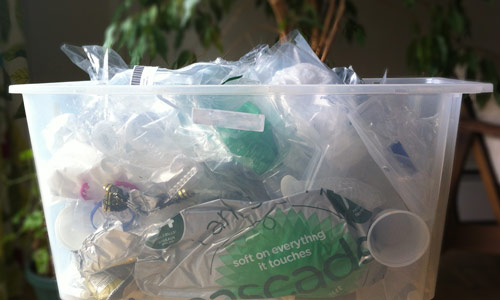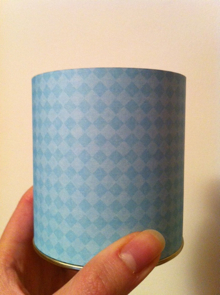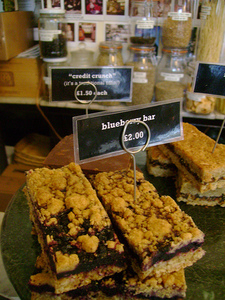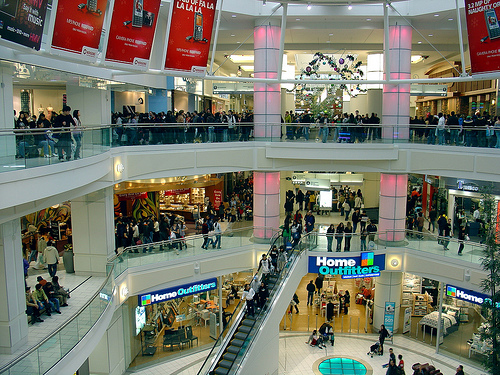
Before you start thinking I’m super gross and live in a pig sty, let me explain.
I’ve been keen on zero waste for a long time. I’m definitely a devoted recycler and composter, having grown up with both at home. But once I moved out I got to make my own choices about where my trash goes and how to keep it from showing up in the first place. Here’s my secret.
This is the most fun you’ll ever have recycling. There are tons of people at the depot. Assuming you pre-sorted your stuff into categories, once you’re there you just drop it into bins and have a chat with people. I usually pay a dollar to have three months’ worth of stuff recycled and the depot is a seven minute bike ride from home. Super convenient.
Continue reading I haven’t taken out the trash in six months »

You might expect a film about a Vancouver couple who spend a year almost zero-waste and without buying any stuff to be a tale of unimaginable hardship and sacrifice. Indeed, the prospects of using the same toothbrush for 365 days, not replacing worn-out clothing, or making crackers from scratch are daunting but The Clean Bin Project‘s Jen and Grant take a delighted, energetic approach akin to Alisa Smith and J.B. MacKinnon’s The 100-Mile Diet, but on the screen. The project was for them a competition for who could produce the least amount of garbage by year’s end (I won’t tell you who won), and involved learning about plastics, asking for their cheese unwrapped in their reusable container, and making the most of an old razor. Their enthusiasm was infectious. The 76-minute film is merely a glimpse at an entire year, but if it suggests anything about the 525,600 minutes they spent saving the planet, I think they enjoyed most of them.
Their artistically delicious film intersperses their own narrative of discovery — and occasional humourous disappointment — with the broader view of our consumption-based lifestyle and its consequences: successful community recycling initiatives; the Pacific Garbage Patch (which is twice the size of Texas); albatross death by plastic; landfills; and incomprehensibly large volumes of disposable stuff as depicted by Seattle artist Chris Jordan.
Continue reading Talking trash: Projecting Change Film Fest opens May 26, and plastic is a Texas-sized problem »
I recently wrote about New York City’s transportation and public space plans and progress. (It was written too quickly and wasn’t very thorough unfortunately — a product of daily blogging.) Hot on those heels, today’s Vancouver Sun opinion piece may spur a little competition if not debate over whether NYC does indeed take the green cake in North America. With Vancouver’s plans unfolding, the Big Apple may not hold on to this position, but this kind of competition is good. Among American cities, however, I’m torn between Portland and Manhattan as the greenest. (The author doesn’t mention Mexico.) To be convinced, I’ll be hearing David Owen’s argument at his lecture, Why Manhattan Is the Greenest City in North America, Thursday, March 17. (Vancouver Playhouse, 7:30pm. Free. Register with lzanatta [at] telus.net)
Continue reading New York City: Modelling eco-density, except for waste »

I had a tea container I couldn’t recycle, so I repurposed it with a strip of cute paper.
GOOD Magazine‘s latest contest asked for photographs of something repurposed and today they announced the winner, beautiful lamps made from glass bottles, by Lauren Lee. They’re stunning and blur art and design together, in the sense that she used essentially a readymade and added both intent and function.
Contributor Ivy Lane calls repurposing objects and materials “upcycling”, in stark contrast to downcycling, which typically refers to the deterioration of plastic as it undergoes multiple recycling processes. Repurposing is the ultimate sustainable thing to do with stuff that already exists. It extends its life, creates something new (our brains thrive on novelty, hence the rampant consumer culture), and inspires creative thinking to imagine objects being used for another purpose in new combinations. It’s easy to think of repurposing as taking something easily recyclable and giving it a new lease on life, but where it succeeds most wonderfully is in saving garbage-bound objects from an eternity in a landfill, bringing to mind the old adage, “One person’s trash is another’s treasure.” (Just check out some select submissions to see what I mean.)
I hope repurposing can find a home nestled between the handmade revolution and high design so as to appeal to anyone. In fact, there is no reason it cannot.
 This daily green blog challenge is in celebration of David Suzuki’s 75th birthday, supporting the David Suzuki Foundation. Please help me out by sponsoring me online now.
This daily green blog challenge is in celebration of David Suzuki’s 75th birthday, supporting the David Suzuki Foundation. Please help me out by sponsoring me online now.
Note: I am writing solely on my own behalf, and do not claim to represent the David Suzuki Foundation or its views here.
I’ve known about London’s Unpackaged shop for awhile and, being the food lover and waste detester that I am, I’m very excited at the thought of visiting the shop when I travel to London this spring.
Check out their tantalizing photos and piece-de-l’existence at their website.
If London’s too far away, there’s a Food Coop in Port Townsend, WA. So next time you’re feeling plastic-free and hungry on your way to Seattle or Portland, or you’re a diehard Twilight fan, be sure to stop by. Supporting small businesses with these genuine values is incredibly important.
I really want one of those blueberry bars.
 This daily green blog challenge is in celebration of David Suzuki’s 75th birthday, supporting the David Suzuki Foundation. Please help me out by sponsoring me online now.
This daily green blog challenge is in celebration of David Suzuki’s 75th birthday, supporting the David Suzuki Foundation. Please help me out by sponsoring me online now.
Note: I am writing solely on my own behalf, and do not claim to represent the David Suzuki Foundation or its views here.

Photo by
Rakka via Flickr
Del Monte has officially gone bananas backwards by introducing individually-wrapped bananas — as if nature hadn’t already done the job. The bags, apparently containing a “Controlled Ripening Technology”, are supposed to extend the shelf life by up to six days.
James Harvey, Del Monte’s UK managing director, told the Fresh Produce Journal: “Del Monte’s new CRT packaging is designed to provide significant carbon footprint savings by reducing the frequency of deliveries and the amount of waste going to landfill. The packaging is also recyclable.” — Mail Online
Uhhh-huh. Funny, I wasn’t aware of this landfill burden that biodegradable bananas are causing. Hmm, wouldn’t it be cheaper and simpler to just buy what you need, solving both the “frequency of deliveries” and “amount of waste” problem and saving the money lost on wasted food and the cost of dealing with the plastic (landfill or otherwise) and avoiding this higher-priced packaged banana? Or, you know, storing your bananas properly and composting? Clearly Del Monte is out to make extra money under the guise of “food waste reduction” in a day and age when people are starting to be critical of excess packaging. (Notice Harvey said recyclable and not biodegradable?) Since when is the banana peel itself not good enough?
As my colleague said, if your bananas are getting too ripe, make some banana bread.
 This daily green blog challenge is in celebration of David Suzuki’s 75th birthday, supporting the David Suzuki Foundation. Please help me out by sponsoring me online now.
This daily green blog challenge is in celebration of David Suzuki’s 75th birthday, supporting the David Suzuki Foundation. Please help me out by sponsoring me online now.
Note: I am writing solely on my own behalf, and do not claim to represent the David Suzuki Foundation or its views here.
I had an interesting time at Metrotown on Friday. Rows upon rows of sequined plastic iPhone cases, “50/50” t-shirts at American Apparel as if 50% polyester were a selling point, fluorescent Nikes, fake culture at Chapters induced by jazz at Starbucks, and dangerous high-heeled shoes left me feeling disconnected and a little cynical. I grew up being called weird, but looking around at this highly materialistic, throw-away, plastic culture truly made me feel weird and unable to understand its fads.
The food services produce disposable dining ware (read: garbage), poor quality food and a shockingly large crowd at McDonald’s. As my friend jokingly suggested sharing a $1.39 recipe-for-bloating, I stood there waffling between despair and a holier-than-thou attitude. I’ve become so distanced from that 12-hour a day, 7-days-a-week consumerist culture that being surrounded by it leaves me shell-shocked.
Continue reading The other 20 percent »



 Photo by
Photo by  I had a tea container I couldn’t recycle, so I repurposed it with a strip of cute paper.
I had a tea container I couldn’t recycle, so I repurposed it with a strip of cute paper.
 Photo by
Photo by  Photo by
Photo by  Metrotown on Boxing Day, 2006. Photo by
Metrotown on Boxing Day, 2006. Photo by